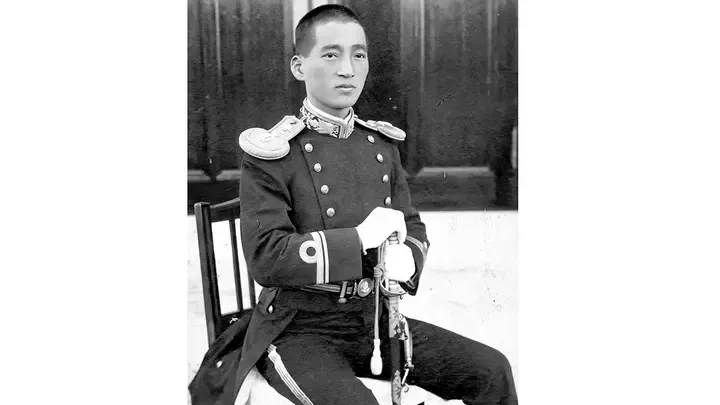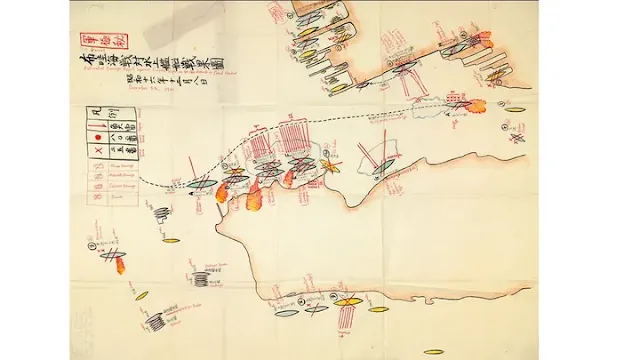While Mitsuo Fuchida played a key role in a significant historical event,
it's essential to note that labeling him as one of the most notorious villains
in American history might oversimplify the complexities of individuals involved
in wartime actions. Fuchida, a Japanese pilot selected by Admiral Isoroku
Yamamoto, led the surprise attack on United States forces at Pearl Harbor on
December 7, 1941.
 |
| Mitsuo Fuchida, shown here as a young officer in 1927, was the Japanese pilot who led the surprise attack on Pearl Harbor on Dec. 7, 1941 |
The attack on Pearl Harbor indeed resulted in a tragic loss of life, with over 2,400 Americans killed. The phrase "a date which will live in infamy" was famously used by President Franklin D. Roosevelt to describe the event. However, discussions around historical figures often involve nuanced perspectives, acknowledging the broader context of war and the actions of individuals during those times.
Mitsuo Fuchida's life took a
profound turn after the war. Initially indoctrinated by Japan's merciless
samurai code, which fueled hatred for and revenge upon its enemies, Fuchida
underwent a transformation.
According to T. Martin Bennett, the author of the World War II tale "Wounded Tiger," Fuchida embraced a
new moral code after the war: "Love
thy enemy." Fuchida's post-war calling was not centered around
violence; instead, he became an evangelist, dedicated to spreading the
teachings of Jesus Christ.
After converting to Christianity,
Fuchida renounced his warrior past and embarked on a journey across the United
States, Japan, and Europe. His mission was to preach the message of Christ,
salvation, and forgiveness, embodying a remarkable transformation from a key
figure in a wartime attack to an advocate for peace and spiritual redemption.
The transformation of Mitsuo
Fuchida is further highlighted by T. Martin Bennett, who mentions that Fuchida
"learned to love the United States," and eventually, Fuchida's
children became citizens of the United States.
 |
| Mitsuo Fuchida, the pilot who led Japan's attack on Pearl Harbor on Dec. 7, 1941, painted a map of the attack from an aerial perspective and personally shared it with Emperor Hirohito |
Bennett's book, titled "Wounded Tiger," delves into the true story of Fuchida's life, depicting the journey of the pilot who led the Pearl Harbor attack and underwent a profound transformation, influenced by an American prisoner and a girl he never met.
Over an 18-year period, Bennett, an
entrepreneur and author from Tennessee, meticulously unraveled the layers of
Fuchida's remarkable yet lesser-known story. "The more I researched his life, the more remarkable it got,"
said Bennett.
"Wounded Tiger" not only
explores Fuchida's post-war encounters but also delves into the stories of two
Americans who endured severe suffering due to Japanese atrocities during World
War II. Jacob DeShazer, an airman on the Doolittle Raid on Tokyo, underwent a
spiritual awakening after obtaining a Bible during 40 months of torture as a
Japanese prisoner of war. Another story involves Peggy Covell, who grew up in
Japan in a family of Christian teachers. The book weaves together these
narratives to provide a comprehensive understanding of Fuchida's remarkable
transformation and the connections forged in the aftermath of war.
Jacob DeShazer's story, as detailed
in "Wounded Tiger," reflects a remarkable transformation. Despite
enduring torment from guards during his 40 months as a Japanese prisoner of
war, DeShazer began treating his tormentors with love. Surprisingly, the guards
responded by treating him as a brother, illustrating the power of forgiveness
and compassion even in the face of adversity.
 |
| "Wounded Tiger" by T. Martin Bennett |
Peggy Covell's response to personal tragedy during the war further contributes to the theme of reconciliation and compassion. After her parents, Christian teachers in the Philippines, were killed by Japanese soldiers in 1943, Covell volunteered at a hospital in Utah treating Japanese prisoners of war. Her compassionate care earned her the moniker of "angel" from the prisoners, including Kazuo Kanegasaki, the engineer responsible for maintaining the aircraft of Mitsuo Fuchida, the Japanese war hero who led the Pearl Harbor attack.
Fuchida, driven by hatred for the
United States and personal ambitions within the Japanese military, achieved his
moment of glory on December 7, 1941. Bennett describes Fuchida's role in the
attack, highlighting his fervent dedication to the imperial cause.
The attack on Pearl Harbor caught
the U.S. Navy and the American people off guard, resulting in a tragic loss of
over 900 lives on the U.S.S. Arizona, a symbol of the profound impact of that
fateful day in history. The interconnected narratives in "Wounded
Tiger" provide a comprehensive view of the complex aftermath of war and
the potential for redemption and reconciliation even in the most challenging
circumstances.
 |
| The USS Arizona (BB-39) burning after the Japanese attack on Pearl Harbor, Dec. 7, 1941 |
Mitsuo Fuchida's pivotal role in the attack on Pearl Harbor is vividly depicted in "Wounded Tiger," including the moment when he sent the celebratory message "Tora! Tora! Tora!" back to Japanese leaders while still circling over the devastation unleashed on Pearl Harbor. "Tora" translates to "tiger" in Japanese and became the title of an Oscar-winning movie about the attack in 1970. Bennett asserts that the original telegraph containing this message, published for the first time in a book, is featured in "Wounded Tiger."
The attack on Pearl Harbor, though
initially a seeming victory, proved to be a great miscalculation in military
history. By the war's end, Japan lay in ruins. Fuchida, who spent August 5,
1945, in Hiroshima, experienced a twist of fate as his hotel was vaporized the
next day by the first atomic bomb attack, one of the events that led to Japan's
surrender.
Fuchida's life took a transformative turn as he encountered spiritual miracles and learned of Jacob DeShazer's story. DeShazer's capacity to love his captors, as detailed in the book, made him a celebrity in both the U.S. and Japan after the war. Fuchida, confounded by DeShazer's story, became friends with him, questioning his own warrior worldview that advocated hatred and revenge.
The book also highlights Fuchida's
meeting with Kazuo Kanegasaki, his engineer, who shared the stories of Peggy
Covell — the "angel" treating Japanese prisoners with dignity despite
her parents' death in the war. These encounters shattered Fuchida's
preconceived notions and contributed to his remarkable transformation from a
key figure in the attack on Pearl Harbor to a proponent of peace and
reconciliation.
Mitsuo Fuchida's journey toward
redemption and spiritual transformation began as he sought to understand the
love displayed by individuals like Peggy Covell and Jacob DeShazer in the face
of hatred. His pursuit of the source of this love marked the commencement of
his spiritual journey.
Fuchida's status in Japan remained significant even after the war, and he is still regarded as a national hero. Miyako Fuchida Overturf, Fuchida's American daughter, acknowledges this in her endorsement of "Wounded Tiger." She reflects on the varied perceptions of her father in the world, with some seeing him as a villain while others view him as a proud warrior who found redemption. Despite these perspectives, she expresses admiration for his bravery, intellect, and sincerity.
After the attack on Pearl Harbor,
Fuchida's stature in Japan was considerable, and he was among the few
individuals to meet Emperor Hirohito. Despite the potential for fame and
fortune, Fuchida chose a different path. According to Bennett, "Instead, he lived in poverty, telling the
world what God had done for him — which was to save him from a life of hatred."
Fuchida's post-war life was dedicated to sharing his spiritual transformation
and advocating for peace and reconciliation.


0 Comments